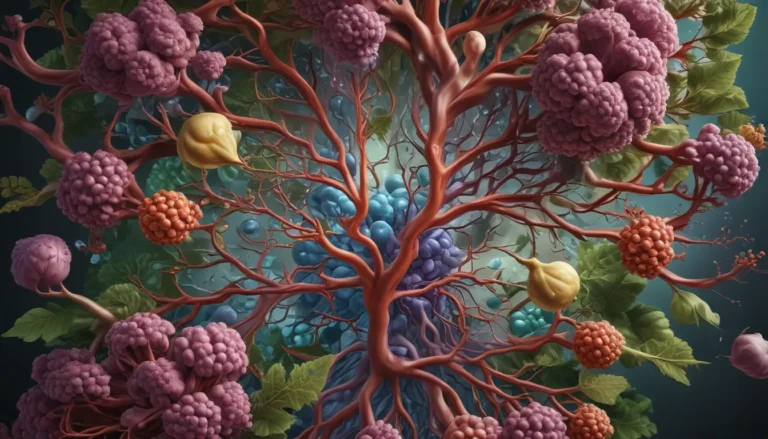A Note About Images: The images used in our articles are for illustration purposes only and may not exactly match the content. They are meant to engage readers, but the text should be relied upon for accurate information.
Are you ready to embark on a journey into the fascinating world of the gustatory system, also known as the sense of taste? This amazing aspect of human biology plays a vital role in how we perceive and enjoy the flavors of the foods and beverages we consume. Beyond the basic tastes of sweet, sour, salty, and bitter lies a complex network of cells, receptors, and neural pathways that work together to provide us with a diverse range of taste experiences. Join us as we uncover 11 mind-blowing facts about the gustatory system, shedding light on its intricacies and revealing some surprising insights into this essential biological process.
The Fascinating World of Taste Buds
Contrary to popular belief, taste buds are not confined to our tongues alone. They can also be found in other parts of our bodies, including the roof of the mouth, throat, and even the esophagus. This widespread distribution allows for a more comprehensive sensory experience, enhancing our ability to perceive flavors.
The Astonishing Number of Taste Buds
On average, the human body is home to approximately 10,000 taste buds. These tiny sensory organs play a crucial role in detecting the basic tastes of sweet, sour, salty, bitter, and umami. However, as we age, the number of taste buds gradually decreases, leading to changes in our perception of flavors over time.
Genetic Influence on Taste Preferences
Have you ever wondered why you prefer certain foods over others? Our taste preferences are influenced by genetic variations that determine our sensitivity to different tastes. This genetic component explains why some individuals lean towards sweet flavors, while others gravitate towards savory or spicy foods.
The Intertwined Relationship Between Taste and Smell
It’s no secret that taste and smell are closely linked. In fact, around 80% of what we perceive as taste is actually influenced by our sense of smell. This synergy between taste and smell allows us to fully experience the complex flavors of various foods.
Women’s Heightened Sense of Taste
Research indicates that women generally have a more heightened sense of taste compared to men. Hormonal fluctuations and genetic factors contribute to this difference, emphasizing the importance of trusting your taste buds, especially when discerning subtle flavor profiles.
Ever-Evolving Taste Preferences
Our taste preferences are not set in stone and can evolve over time. Factors such as culture, exposure to new foods, and personal experiences play a significant role in shaping our culinary likes and dislikes. Embrace the journey of discovering new flavors and expanding your palate.
Debunking the Myth: Spicy Foods and Taste Buds
Despite common misconceptions, spicy foods do not cause physical harm to our taste buds. The burning sensation experienced when consuming spicy foods is due to a compound called capsaicin, which stimulates pain receptors but does not cause any lasting damage. So feel free to indulge in those fiery dishes without fear.
Medications and Their Impact on Taste
Certain medications can alter our sense of taste, leading to temporary changes in our perception of flavors. This side effect, known as dysgeusia, can range from a metallic taste in the mouth to a diminished ability to detect certain tastes. If you notice any taste changes after starting a new medication, consult your healthcare provider.
The Regenerative Nature of Taste Buds
Did you know that our taste buds regenerate every 1-2 weeks? This constant regeneration ensures that our taste buds remain functional and responsive to different flavors, allowing for continuous sensory experiences that enrich our culinary adventures.
Cultural Influences on Taste Preferences
Our taste preferences are not solely dictated by biology but are also shaped by cultural factors. Each culture has its own unique culinary traditions that influence the flavors and ingredients individuals find enjoyable. Exploring new cuisines can lead to a deeper appreciation of diverse taste profiles.
Aging and Changes in Taste Perception
As we age, various factors can impact our perception of taste. Decreased taste bud sensitivity, changes in saliva production, and age-related conditions can contribute to a decline in the ability to taste certain flavors or a heightened preference for stronger tastes. Embrace the changes in taste perception as part of the natural aging process.
In conclusion, the gustatory system is a remarkable sensory system that allows us to experience the multitude of flavors that enrich our lives. From the distribution of taste buds to the influence of genetics and cultural factors, this complex system continues to captivate scientists and food enthusiasts alike. The next time you savor your favorite dish, take a moment to marvel at the incredible capabilities of your gustatory system.
FAQs:
Q: How many taste buds do we have?
A: On average, humans have around 10,000 taste buds, though this number can vary.
Q: Can taste buds die?
A: Yes, taste buds can die and regenerate every 1-2 weeks, leading to temporary changes in taste perception.
Q: Can taste buds become desensitized?
A: Yes, repeated exposure to flavors can desensitize taste buds over time.
Q: Is taste influenced by other factors?
A: Yes, taste can be influenced by factors like smell, texture, temperature, and emotional state.
Q: Can we taste different flavors with different parts of our tongue?
A: Contrary to a common myth, all taste buds on the tongue can detect all flavors.
Delve deeper into the enchanting world of taste with umami burger nutrition facts, taste perception genetics, and fun taste buds trivia. Explore the intricate interplay between flavors, genes, and biology that shape your unique palate. From savory sensations to astonishing discoveries, there’s always more to learn about the incredible gustatory world.
As we strive to provide you with trustworthy and engaging content, each fact on our site is contributed by real users like you. Our dedication to accuracy and reliability ensures that the information we share is not only fascinating but also credible. Explore and learn with us, confident in our commitment to quality and authenticity.






